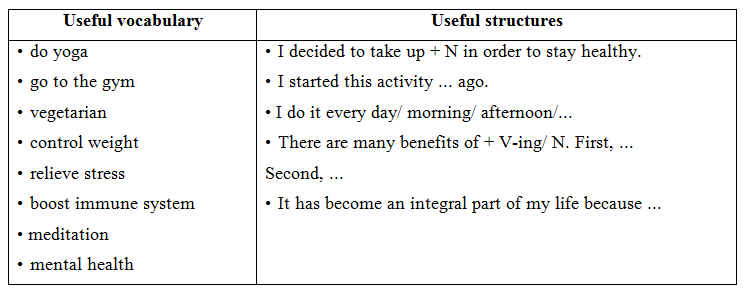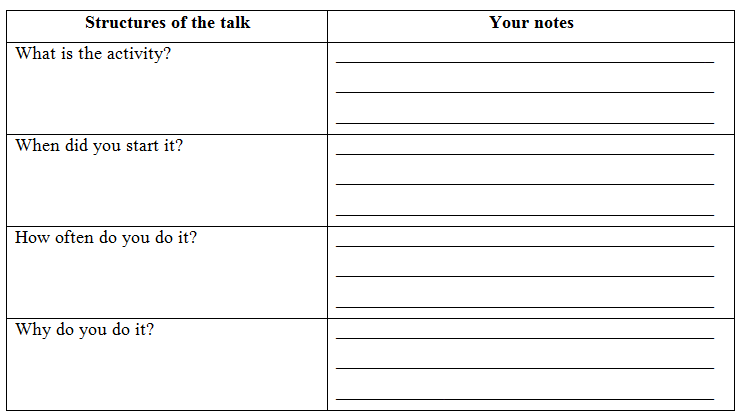Câu hỏi:
01/04/2024 46Listen to the story of a volunteer and decide whether the statements below are TRUE (T) or FALSE (F).
1. The speaker is from Colombia, and volunteered to teach English in Germany.
Trả lời:
 Giải bởi Vietjack
Giải bởi Vietjack
Audio script:
I am German, and I went abroad to do voluntary work.
Last year, I volunteered to teach English in Colombia. I wasn’t quite sure about how I would be as a teacher. I really wanted to try it, and I guessed I could help from a unique perspective because English is my second language. Of course, when you don’t speak Spanish, there is a barrier between you and the people you’re teaching. What really surprised me, though, is how easy it is to overcome that. You actually have more in common with the kids than you think.
During my 2 weeks in Colombia, I taught boys between 8-14 years old, and they were amazing. I still remember their smiling faces, full of love and eager to learn. The highlight was a drawing activity I organized for my final volunteer day. I was so happy with how well it went and I felt so lucky to be gifted one of the drawings. I will treasure it forever.
I’ll never forget what it was like saying goodbye. I naively thought before I went that I was giving something to them, but actually, I was the one who received so much.1. The speaker is from Colombia, and volunteered to teach English in Germany.
Tôi là người Đức và tôi đã đi ra nước ngoài để hoạt động tình nguyện.
Năm ngoái, tôi đã từng tình nguyện làm giáo viên tiếng Anh ở Colombia. Tôi khá không chắc chắn về việc tôi sẽ trở thành một giáo viên như thế nào. Tôi thực sự muốn thử nó, và tôi đoán rằng tôi có thể giúp đỡ theo một khía cạnh độc đáo, bởi vì tiếng Anh là ngôn ngữ thứ hai của tôi. Tất nhiên, khi bạn không nói tiếng Tây Ban Nha, sẽ có một rào cản giữa bạn và những người bạn dạy. Tuy nhiên, điều thực sự khiến tôi ngạc nhiên là vượt qua điều đó mới dễ dàng làm sao. Bạn thực sự có nhiều điểm chung với những đứa trẻ hơn những gì bạn nghĩ.
Trong suốt 2 tuần tôi ở Colombia, tôi đã dạy những cậu bé từ 8-14 tuổi và chúng thật tuyệt vời. Tôi vẫn nhớ khuôn mặt tươi cười, tràn đầy tình yêu và ham học hỏi của chúng. Điểm nổi bật là hoạt động vẽ tranh mà tôi tổ chức trong ngày tình nguyện cuối cùng của tôi. Tôi đã rất hạnh phúc vì nó đã diễn ra tốt đẹp và tôi cảm thấy mình thật may mắn khi được tặng một trong những bức vẽ. Tôi sẽ trân trọng nó mãi mãi.
Tôi không bao giờ quên những cảm giác khi nói lời tạm biệt. Trước khi đi, tôi ngây thơ nghĩ rằng tôi mới là người cho đi, nhưng thực ra tôi là người được nhận lại rất nhiều.Đáp án: False
Dịch nghĩa câu hỏi: Người nói đến từ Colombia và tình nguyện dạy tiếng Anh ở Đức.
Giải thích: Thông tin ở câu đầu tiên của bài: “I am German, and I went abroad to do voluntary work.”
CÂU HỎI HOT CÙNG CHỦ ĐỀ
Câu 1:
24. Everyone noticed that he_________to be sympathetic in the last meeting.
24. Everyone noticed that he_________to be sympathetic in the last meeting.
Câu 2:
2. Those who spent money on themselves experienced greater happiness.
2. Those who spent money on themselves experienced greater happiness.
Câu 4:
4. The population of_________during the years of herbicide spraying was approximately 18 million.
4. The population of_________during the years of herbicide spraying was approximately 18 million.
Câu 5:
5. Though some people are altruistic, they don’t have greater feelings of happiness
Câu 6:
25. When I was 5 years old, I_________to church for the first time.
25. When I was 5 years old, I_________to church for the first time.
Câu 7:
Rewrite each sentence so that the new sentence has a similar meaning to the original one, using the words in brackets.
1. The last time I saw her was 5 years ago. (for)
→____________________________________________
1. The last time I saw her was 5 years ago. (for)
→____________________________________________
Câu 9:
2. This is the first time I have visited Edinburgh, (never)
→____________________________________________
2. This is the first time I have visited Edinburgh, (never)
→____________________________________________
Câu 10:
4. It is_________to use words like ‘dumb’, ‘blind’ and ‘deaf’ to the disabled. (RESPECT)
4. It is_________to use words like ‘dumb’, ‘blind’ and ‘deaf’ to the disabled. (RESPECT)
Câu 11:
9. He left the army in 1983 and_________as a guard in an orphanage.
9. He left the army in 1983 and_________as a guard in an orphanage.




